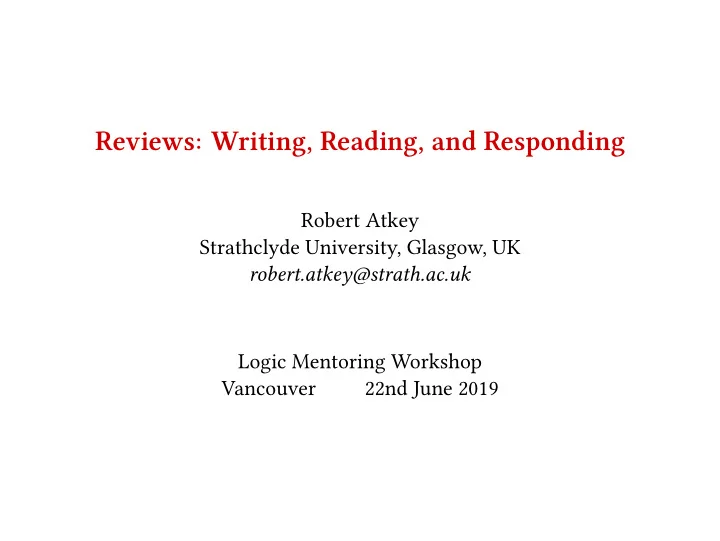

Reviews: Writing, Reading, and Responding Robert Atkey Strathclyde University, Glasgow, UK robert.atkey@strath.ac.uk Logic Mentoring Workshop Vancouver 22nd June 2019
Why?
Tie Process — — You write down your best ideas backed up with proofs and other evidence — You submit it to a workshop, conference, or journal — … time elapses … — You get back reviews — crushing your dreams / recognising your genius 1 1 Delete as appropriate
Tie Process (from the other side) — (For workshops / conferences) — Chair gathers a Programme Commituee — n papers get submitued — Commituee writes reviews, or solicits external reviews — At larger conferences: Author response period — Commituee builds a programme of n − r selected papers
Why have reviews? — (For workshops / conferences) — Maintain scientifjc standards — Manage the atuention of the community — Construct a balanced and interesting programme
Why do reviews? — — You don’t get paid! — Help the community — Shape the community — (Most?) Institutions recognise reviewing
Writing Reviews
Writing a review — — What does the paper claim? is this clear? — Is what they claim interesting? — Does the paper support the claim? proofs, benchmarks… — Is the paper writuen to a high enough standard?
Typical Structure — “Tiings that I liked” — Typically, reviews are addressed to the author — Low-level comments — “Tiings that could be improved” — — — List of detailed points — Recommendation (accept / reject) and high level justifjcation — Synopsis of the paper — Score and Expertise primarily feedback to them.
Possible Reasons for Rejection — — Technical fmaw — Too small a contribution — Unclear contribution — (Very) Bad writing — Out of scope, or wrong audience
(side remark: Basing abstract data types on set theory is more appealing to me and I have always wondered why the community is so attached to category theory.)
Be Constructive! — — — Don’t suggest a “lesser” venue — Don’t rewrite the paper — Don’t be patronising — Try to ofger suggestions for improvement Don’t be dismissive — — Be specifjc — Try you hardest to recognise good points in a paper — Tie authors have their vision, which may difger from yours — Tie authors will have put a lot of work in! Don’t suggest fjnding a native English speaker
"outwith" nitpick: no offense intended, but I originally thought this was a typo. Perhaps "outside" could do for the US part of the audience? : (
Diffjculties — — Badly writuen? or do I lack the right background knowledge? — Conference papers don’t ofuen include full proofs — Checking proofs in detail is time consuming — “I was going to do that!”
Ethical issues — — Tie authors have submitued their work in confjdence — It is their decision on how it is released — It is their decision on how to present their work — Do not discuss the work or your review publicly — You are anonymous, but authors are not (in the end) — Declare confmicts
Reading reviews
Reading (the bad way) — — Spend the notifjcation day refreshing emails, panicking — Due to timezones, the email arrives when you’re asleep — You sleepily read reviews on your phone, missing any nuance — If it is a reject, spend the day angry, before reading properly — You may still be angry afuer that …
Reading — — Try to understand the reviewers’ point of view — At best, free, unbiased, expert feedback — Even if accept, take criticism and suggestions seriously — Unfortunately, bad reviews happen
Writing responses
Responses — — Take time to digest the reviews — Tiank the reviewers — Opportunity to correct misconceptions — Answer direct questions directly, make answers easy to fjnd
Conclusions
— Reviews help maintain the research community Tiis is what is interesting — Writing reviews is hard work — Take reviews seriously — Use reviews to build the community you want to see!
Recommend
More recommend